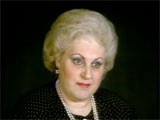<< Previous | Displaying results 551-560 of 571 for "" | Next >>
-
Irene Hizme and Rene Slotkin describe being separated from their mother upon arrival in the Auschwitz camp
Oral HistoryIrene and Rene were born Renate and Rene Guttmann. The family moved to Prague shortly after the twins' birth, where they were living when the Germans occupied Bohemia and Moravia in March 1939. A few months later, uniformed Germans arrested their father. Decades later, Irene and Rene learned that he was killed at the Auschwitz camp in December 1941. Irene, Rene, and their mother were deported to the Theresienstadt ghetto, and later to the Auschwitz camp. At Auschwitz, the twins were separated and subjected…
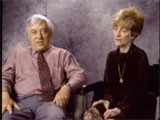
-
Hans Heimann describes internment in Italy
Oral HistoryThe Germans annexed Austria in March 1938. In 1939, Hans fled first to Hungary and then to Italy. He and his parents were interned in various towns. Hans's father became ill and died in 1940. In 1943, Hans and his mother were warned of German plans to deport Jews from Italy to Poland. They moved to smaller towns until liberation by the British in August 1943. Hans worked as an interpreter for the Allies until 1945, when he worked for the American Jewish Joint Distribution Committee and helped resettle…
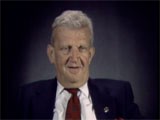
-
Wilek (William) Loew describes Budapest after he escaped from the Lvov ghetto and before the German occupation of Hungary
Oral HistoryWilek was the son of Jewish parents living in the southeastern Polish town of Lvov. His family owned and operated a winery that had been in family hands since 1870. Wilek's father died of a heart attack in 1929. Wilek entered secondary school in 1939. Soon after he began school, World War II began with the German invasion of Poland. Lvov was in the part of eastern Poland annexed by the Soviet Union. Although the Soviets took over Wilek's home and the family business, Wilek was able to continue his…
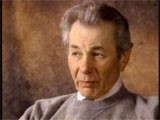
-
Wilek (William) Loew describes forced labor in Lvov
Oral HistoryWilek was the son of Jewish parents living in the southeastern Polish town of Lvov. His family owned and operated a winery that had been in family hands since 1870. Wilek's father died of a heart attack in 1929. Wilek entered secondary school in 1939. Soon after he began school, World War II began with the German invasion of Poland. Lvov was in the part of eastern Poland annexed by the Soviet Union. Although the Soviets took over Wilek's home and the family business, Wilek was able to continue his…
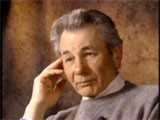
-
Wilek (William) Loew describes Jewish life in prewar Lvov, including restrictions on admission to schools
Oral HistoryWilek was the son of Jewish parents living in the southeastern Polish town of Lvov. His family owned and operated a winery that had been in family hands since 1870. Wilek's father died of a heart attack in 1929. Wilek entered secondary school in 1939. Soon after he began school, World War II began with the German invasion of Poland. Lvov was in the part of eastern Poland annexed by the Soviet Union. Although the Soviets took over Wilek's home and the family business, Wilek was able to continue his…
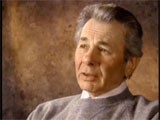
-
Wilek (William) Loew describes refugees from western Poland after their arrival in Soviet-occupied Lvov
Oral HistoryWilek was the son of Jewish parents living in the southeastern Polish town of Lvov. His family owned and operated a winery that had been in family hands since 1870. Wilek's father died of a heart attack in 1929. Wilek entered secondary school in 1939. Soon after he began school, World War II began with the German invasion of Poland. Lvov was in the part of eastern Poland annexed by the Soviet Union. Although the Soviets took over Wilek's home and the family business, Wilek was able to continue his…
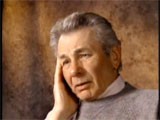
-
Wilek (William) Loew describes political prison in Budapest after the Germans arrested him as a Polish spy
Oral HistoryWilek was the son of Jewish parents living in the southeastern Polish town of Lvov. His family owned and operated a winery that had been in family hands since 1870. Wilek's father died of a heart attack in 1929. Wilek entered secondary school in 1939. Soon after he began school, World War II began with the German invasion of Poland. Lvov was in the part of eastern Poland annexed by the Soviet Union. Although the Soviets took over Wilek's home and the family business, Wilek was able to continue his…
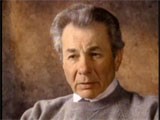
-
Wilek (William) Loew describes the Soviet occupation of Lvov in 1939
Oral HistoryWilek was the son of Jewish parents living in the southeastern Polish town of Lvov. His family owned and operated a winery that had been in family hands since 1870. Wilek's father died of a heart attack in 1929. Wilek entered secondary school in 1939. Soon after he began school, World War II began with the German invasion of Poland. Lvov was in the part of eastern Poland annexed by the Soviet Union. Although the Soviets took over Wilek's home and the family business, Wilek was able to continue his…
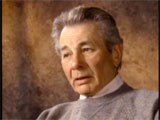
-
Guta Blass Weintraub describes Starachowice ghetto cultural life
Oral HistoryGuta and her family fled to Starachowice, Poland. There, the Germans ordered them and other Jews into a ghetto and put them to work in forced-labor factories. As an act of resistance at the Majowka camp, Guta attacked a Nazi guard preparing to shoot her and other prisoners at a mass grave. A bullet grazed her, but Guta pretended to be fatally wounded. Days later, Guta was deported to Auschwitz, then Ravensbrueck, where she was liberated. Her mother died only weeks short of freedom.
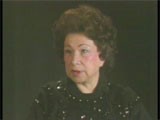
-
Freya (Alice) Lang Rosen recalls experiences while hiding in France
Oral HistoryRecalls experiences while hiding in France
